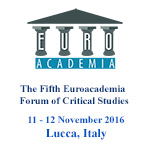Euroacademia Conferences
 Europe Inside-Out: Europe and Europeanness Exposed to Plural Observers (9th Edition) April 24 - 25, 2020
Europe Inside-Out: Europe and Europeanness Exposed to Plural Observers (9th Edition) April 24 - 25, 2020 Identities and Identifications: Politicized Uses of Collective Identities (9th Edition) June 12 - 13, 2020
Identities and Identifications: Politicized Uses of Collective Identities (9th Edition) June 12 - 13, 2020 8th Forum of Critical Studies: Asking Big Questions Again January 24 - 25, 2020
8th Forum of Critical Studies: Asking Big Questions Again January 24 - 25, 2020 Re-Inventing Eastern Europe (7th Edition) December 13 - 14, 2019
Re-Inventing Eastern Europe (7th Edition) December 13 - 14, 2019 The European Union and the Politicization of Europe (8th Edition) October 25 - 26, 2019
The European Union and the Politicization of Europe (8th Edition) October 25 - 26, 2019 Identities and Identifications: Politicized Uses of Collective Identities (8th Edition) June 28 - 29, 2019
Identities and Identifications: Politicized Uses of Collective Identities (8th Edition) June 28 - 29, 2019 The European Union and the Politicization of Europe (7th Edition) January 25 - 26, 2019
The European Union and the Politicization of Europe (7th Edition) January 25 - 26, 2019 7th Forum of Critical Studies: Asking Big Questions Again November 23 - 24, 2018
7th Forum of Critical Studies: Asking Big Questions Again November 23 - 24, 2018 Europe Inside-Out: Europe and Europeanness Exposed to Plural Observers (8th Edition) September 28 - 30, 2018
Europe Inside-Out: Europe and Europeanness Exposed to Plural Observers (8th Edition) September 28 - 30, 2018 Identities and Identifications: Politicized Uses of Collective Identities (7th Edition) June 14 - 15, 2018
Identities and Identifications: Politicized Uses of Collective Identities (7th Edition) June 14 - 15, 2018
The City as a Spectacular Monster and the Hysterical Baudrillardian Flâneur
-
-

-
Presentation speakers
- Gian Carla Agbisit, University of Santo Tomas, Philippines
Abstract:
Propelled by the new kind of capitalism, and aided by a scientific and technological progress that culminates in virtual perfection, the city has now become both the producer and the consumer of spectacle. In fact, the city has become, in itself, a grand spectacle that uses the reification of categories as a differential device that helps perpetuate the spectacle. Using Baudrillard’s critique of the consumer society and his idea of simulation, the diversity of the city is read here as a part of the spectacle, making revolutionary movements against the spectacular society impossible. This is simulation at its best. In the city, everything has become part of a show. Consequently, the city houses urbanites that have become preoccupied with images. The senses of hearing, of smelling, of tasting, and of touching have been under the rule of seeing. Everything has to appear, hence everything has to be seen, and vice versa. In the city, the tyrant has different faces, and oppression is no longer about forcing the other to hide, but of forcing everything to appear. In this seemingly endless cycle of seeing and showing, and showing and seeing, critique is diminished to banal images, and the critic is believable only if he becomes the voyeur. Taking after Baudrillard’s idea that the demise of Marxist theory is its preoccupation with the concepts of labor and capital, the traditional Marxist, still enchanted by the drama of the proletariat, can never recognize, and therefore, can never respond to the oppression of the banality of meaning. Perhaps, even, the traditional Marxist critique of society is a dream that leads to the fulfillment of the spectacle society. This paper aims to articulate the temporal nuances of Baudrillardian declarations of simulation and to propose the combination of Benjamin’s idea of the flâneur and Baudrillard’s idea of radical thought as the critic of the urban.
-
Related Presentations

(Im)Possible Subjects: The Appearance and Disappearance of Greek Woman Writer Dora Rosetti Performing Forbidden Lesbian Desire and Identity in “Her Lover” and in “My Friend Mrs Dora Rosetti”
- Elisavet Pakis

Legal Principles and Refugees
- Martin Glick













